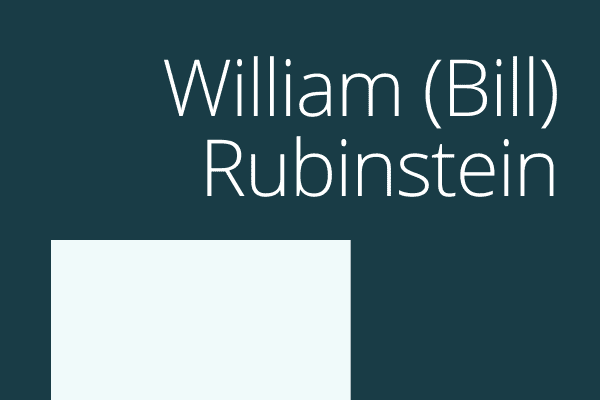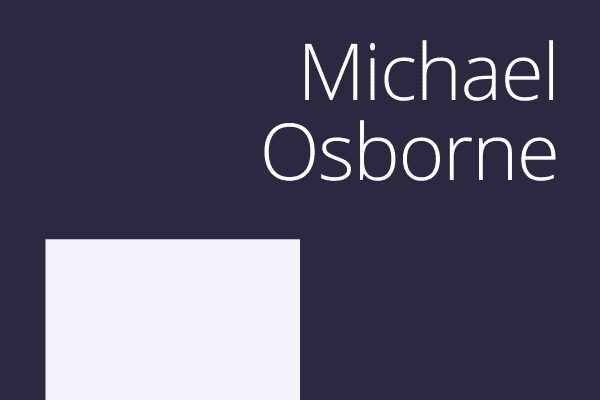It is significant that it takes three people to write this obituary as a document of Graeme’s diverse and productive life that takes in his brilliant and original scholarship in the area of Patristics (and Early Christianity), his excavation of the Hellenistic site of Jebel Khalid in Syria, and his support, in several capacities, of classical studies and the humanities more generally.
Graeme Clarke, a New Zealander, began his tertiary education at the University of Auckland where he graduated in 1957 with a BA (awarded the Fowlds Memorial Certificate for the most outstanding student in the Faculty of Arts) and an MA with first-class honours in Latin and Ancient Greek. Before beginning his studies at Balliol College, Oxford, where he was to read Greats, Graeme spent two academic terms teaching Classics at the Canberra University College (now the Australian National University). Here his small senior Latin class comprised, as he described it, the ‘Holy Family’: an Ursuline Mother, a Sacred Heart Father, a Christian Brother, and a Sisters of Mercy Nun. They read Vergil’s Eclogues.
Graeme completed that second BA in 1959, graduating with first-class honours in the School of Literae Humaniores. He was awarded a College Prize by Balliol College and a Jenkyns Travel Award. He subsequently returned to Australia, to the ANU, where he taught once more, now as Lecturer, from 1961 to 1963. There followed appointments at the University of Western Australia (as Senior Lecturer, 1964-1966) and Monash (as Associate Professor, 1967-1968), before he became Professor of Classical Studies at the University of Melbourne (1969-1981).
Graeme at the University of Melbourne
When Graeme took up the University of Melbourne’s chair of Classical Studies at the beginning of 1969, the subject was facing a crisis. Enrolments and the staff-student ratio were about the lowest of any department in the Arts Faculty, leaving the department extremely vulnerable. By the time Graeme left in 1982 the figures were the strongest. That improvement was very much due to Graeme’s leadership and vision in adjusting the curriculum and introducing courses such as Beginners’ Latin, Classical Studies taught in translation, and eventually Modern Greek, innovations quite revolutionary at the time. Postgraduate enrolments, previously almost non-existent, blossomed. Morale was high among the staff who were encouraged to devise unit courses in their own areas of expertise, which they were happy to teach. Graeme encouraged collegiate activities and staff outings, such as Cup Day get-togethers and fishing trips.
Graeme was also largely responsible for the considerable expansion of the department’s museum collection and Classics Library. The museum collection, already well established, most notably by the John Hugh Sutton bequest in 1926, had remained static. Graeme frequently gained funds that enabled the purchase of an ancient object, so adding a remarkable 52 vases and many coins, all to be used for teaching, particularly in the newly introduced Classical Art and Archaeology courses. The collection was housed, for all to see, in the Classics Library, which was open to students and, under Graeme’s initiative, had grown to include some 20,000 volumes. So Classics not only became strong in numbers but its offerings were rich and diverse while still maintaining full pass- and honours-level courses in both Latin and Ancient Greek. Graeme’s presence and the high status of the department would have been factors influencing a number of internationally renowned scholars who chose to spend their study leave entirely in Melbourne.
Graeme at the Humanities Research Centre, ANU
In 1982 Graeme moved back to Canberra as Professor of Classical Studies and Deputy Director of the ANU’s Humanities Research Centre (1982-1990). Under the Directorship of Ian Donaldson, and subsequently under Graeme’s leadership (from 1990 until his retirement in 1999), the HRC developed into a significant hub for humanities scholars from across the world, a place where visitors could conduct research and enjoy the company of others and a focal point for Australian-based humanities scholars, who were able to attend the important conferences and seminars that were held there. Ian Donaldson describes Graeme at this time as ‘an unfailingly alert and animating presence during this period of energetic debate and creative turmoil in the humanities, whose fundamental nature seemed so often, so excitingly, to be open to revision and refashioning’. In seminars and conference presentations Graeme was the most courteous of participants; yet his questions to the speaker were always probing and insightful. He was the engaged participant, open to new ideas and to fresh approaches. He drew on a deep fund ofknowledge—knowledge that spanned the disciplines that the term Classical Studies embraces: history, literary studies, philosophy, early Christianity and patristics, and archaeology.
Graeme & Patristics
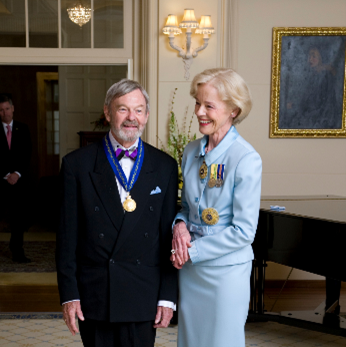
On being appointed to the Order of Australia in 2009 Graeme was asked how history would best remember him. He nominated his published works, particularly his four volumes on the letters of Cyprian of Carthage, which had never been annotated before and which illuminated a dozen years of life in Carthage in the middle of the third century AD. That research established him as a world expert on the social background for early Christian studies, particularly through textual studies of the literary works of the early- to mid-third century in which Christians explained and defended their religion.
Graeme’s first major book, a translation and commentary of the Octavius by Minucius Felix (New York, 1973) (for which, along with other published work, he was awarded a D.Litt. from the University of Melbourne in 1976) was followed by the four hefty volumes of the Letters of Cyprian (Ancient Christian Writers, Mehwah, NJ, 1984–1989). A fifth Cyprian volume, on his De Lapsis, in French with Michel Poirier (Sources Chrétiennes, Paris), was published in 2012. These works have all been widely acclaimed. In particular, they consider such topics as the more intimate and arresting details of the persecution of Christians by the Roman emperor Decius, the relations of Cyprian in Carthage with Rome and other churches, and the problems of sacramental discipline, all matters of considerable importance in the study of the early church. After leaving Melbourne Graeme co-edited four valuable volumes from conferences he had initiated, Rediscovering Hellenism: the Hellenic inheritance and the English imagination (CUP, 1989), Identities in the Eastern Mediterranean in Late Antiquity (Sydney, 1998), Reading the past in Late Antiquity (Australian National University Press, 1990), and Christianity in Roman Africa (Grand Rapids, Michigan, 2014).
Graeme as archaeologist
In 1984, Graeme was asked to join the University of Melbourne’s dig at El Qitar on the Syrian Euphrates, a salvage operation ahead of the flooding to be caused by the new Tishreen dam. There he studied and published inscriptions and early Christian tombs. In his search for such he wandered across a nearby plateau called Jebel Khalid and noticed a plethora of pottery on the surface. At first he thought this a Roman site but it soon became clear that it was Hellenistic and amazingly free of superimposed Roman structures. Graeme invited Peter Connor of the University of Melbourne to join him in setting up a campaign to survey and excavate the site. They began digging sondages in 1987, and the results led to full-scale excavation, in ensuing years 1989–2010, of the Acropolis, the Main Gate, the North-west Tower, a housing insula and part of a possible commercial area. Successive ARC grants recognised the importance of the site as a Seleucid settlement at a strategic point on the river. In 1996 Peter Connor died and there was a lull in excavation while study seasons were held to catch up on the immense amount of artefactual material uncovered. In 2000 Graeme returned to the jebel and began excavating the Temple site, later moving on to the Palaistra, a uniquely Greek institution in this part of the world.
As a field director Graeme was tireless, meticulous, and kind. Jebel Khalid is a large site with considerable distance between the areas being excavated, but no hill was too steep and no day was too hot to stop him visiting every part of the site once a week, to give encouragement to the workers and to engage in perceptive discussion with the trench supervisors. He never missed a day supervising his own area. His Bedouin workers loved him, as much as he loved them. There was always laughter coming out of his own trenches – with the odd baby being rocked to sleep nearby in a handy zembil, which was meant to be used for pottery. He respected the family values and loyalties they observed, so would agree to employ family members who were not always in their prime, such as old Turqiyya, who would sit on an island of dirt and dig around herself; he positioned her where she could do least damage. The local villagers converted his name to “Karim” which means generous or hospitable.
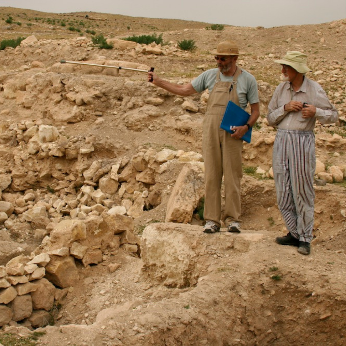 The dig season was always carefully organised. As director, Graeme never claimed any special privileges but mucked in like everyone else – counting sherds, analysing pottery, clearing the drains and cleaning the toilet. Life was often hard with electricity and water frequently being cut off. In study seasons, when no excavation took place, Graeme was first into the pottery compound in the morning and could be just seen in a cloud of dust as he swept the mats ready for work to commence. When, inevitably, tensions arose within the group, he would deal with both sides kindly and tactfully. He was sympathetic when team members became ill, as they often did in that environment. He could judge when a break was needed and would organise a trip upriver or Image supplied by Bob Miller to a nearby site on the Euphrates.
The dig season was always carefully organised. As director, Graeme never claimed any special privileges but mucked in like everyone else – counting sherds, analysing pottery, clearing the drains and cleaning the toilet. Life was often hard with electricity and water frequently being cut off. In study seasons, when no excavation took place, Graeme was first into the pottery compound in the morning and could be just seen in a cloud of dust as he swept the mats ready for work to commence. When, inevitably, tensions arose within the group, he would deal with both sides kindly and tactfully. He was sympathetic when team members became ill, as they often did in that environment. He could judge when a break was needed and would organise a trip upriver or Image supplied by Bob Miller to a nearby site on the Euphrates.
It was a great sadness to him that he could not attend what was to be the final season in 2010, when he developed heart trouble at the last moment. Perhaps some other director would have cancelled the dig, but he generously allowed the team to proceed. No one then knew that the conflict would begin the following year.
And it was that same generosity that was the key to his achievement in publishing final reports promptly. As series editor, he encouraged and employed selected specialists to pursue their own line of research, without ever laying claim to anything except his own specialist areas. It is a rare achievement that seven volumes of final reports in Jebel Khalid on the Euphrates, published between 2002 and 2023, together with many articles, are now available for study, as they no doubt will be when others return to Syria and to the site of Jebel Khalid. A small part of it is damaged by the conflict but there is still plenty to uncover, work which will have to be based on the prior work of Graeme and his team. That is a fine memorial to Graeme’s enjoyment of what his children call his “happy place.”
The former Director of Excavations and Studies at the General Directorate of Antiquities and Museums of Syria, Damascus, Michel al-Maqdissi, wrote to the Academy recently: ‘The death of Professor Graeme Clarke is a terrible loss for Near Eastern archeology and for Syria. The exemplary works at Jebel Khalid and the excavation carried out under his direction will remain one of the crucial stages for our national archaeology’.
Graeme & the Academy of the Humanities
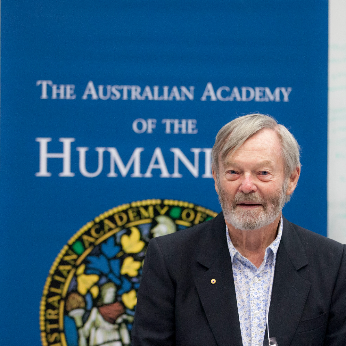 Graeme, deemed ‘a historian of outstanding quality’, was elected a Fellow of the Australian Academy of the Humanities in 1975. His sustained contributions to the work of the Academy are unparalleled: as Council member (1976-1977, 1986-1994); as Vice-President (1976-1977, 1985-1986); as Treasurer (1986-1994), and as Honorary Secretary (2000-2014). In recent years, he was a valued informal source of corporate memory and wisdom. His contributions to and support of Australian humanities scholarship extended beyond the Academy: he was, for example, President of the Australian Society for Classical Studies (1976-1978); and from 1982 he was a member of Council and from 2007 until his death a member of the Executive Committee of the Australian Archaeological Institute at Athens.
Graeme, deemed ‘a historian of outstanding quality’, was elected a Fellow of the Australian Academy of the Humanities in 1975. His sustained contributions to the work of the Academy are unparalleled: as Council member (1976-1977, 1986-1994); as Vice-President (1976-1977, 1985-1986); as Treasurer (1986-1994), and as Honorary Secretary (2000-2014). In recent years, he was a valued informal source of corporate memory and wisdom. His contributions to and support of Australian humanities scholarship extended beyond the Academy: he was, for example, President of the Australian Society for Classical Studies (1976-1978); and from 1982 he was a member of Council and from 2007 until his death a member of the Executive Committee of the Australian Archaeological Institute at Athens.
Graeme was one of the Good Citizens in our broad field.
To conclude
Just as Graeme tried to understand the troubled world of the bishop Cyprian through the rich corpus of letters that the bishop had left behind, so he used the architecture and the artefacts that were excavated at Jebel Khalid to investigate the way of life that produced them—and to understand that world. In an interview for the ANU Reporter (10 August 1990) on his becoming Director of the Humanities Research Centre, Graeme describes his own research in these terms: ‘I want to know how the ancient Greeks and Romans saw the world. To do that I have to use whatever I can—not just what they said in their literary [works], but their artefacts, their towns, cities, their daily routines, their political, social, and economic world, as well as their religions . . . I’m interested in the history of ideas and all the other amalgam of evidence that exists. . . . This is a humane study, a study of men and women’.
All the above builds a picture of a successful and engaging academic, of a great–and yet remarkably modest–scholar, but it does not sufficiently represent Graeme as a wonderful human being, a mentor and a friend, as so many have commented from their hearts. These are people with whom Graeme had collaborated, students he had taught, researchers he had helped and encouraged, friends to whom he had always been loyal. We pay tribute to Graeme’s generous spirit, his innate ability to empathise, and his unfailing concern for the wellbeing of others. Our sympathy is extended to his family, who always supported him and whom he loved deeply. He will not be forgotten.


